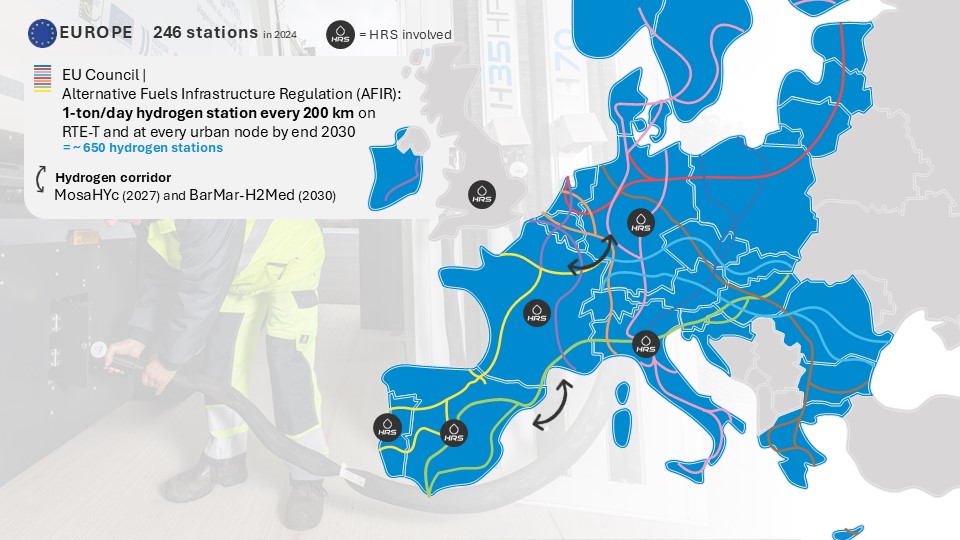
Q&A with Monaco Hydrogen Alliance (MHA) and Hydrogen Refueling Solutions (HRS) Deputy CEO, Dr. Olivier DHEZ
Dr. Olivier Dhez, Deputy CEO of HRS, the European leader in refueling stations for all types of hydrogen vehicles.
By the end of 2024, HRS will have 27 stations installed and delivered more than 100 tons of hydrogen in 2 years.
Present in Europe (France, United Kingdom, Spain, Germany) as well as in the Middle East, the company continues to strengthen its position in this strategic market.
Can you share your vision of hydrogen mobility with us?
Hydrogen mobility is based on a complete supply chain, integrating the production, refueling and use of vehicles. It represents an essential solution for the decarbonization of transport, in particular heavy duty and intensive mobility on a large scale.
To meet these challenges, HRS designs, manufactures, installs and maintains scalable and high-performance refueling stations, capable of delivering between 300 kg and 4 tons of hydrogen per day. These infrastructures support the acceleration of uses and deployment of hydrogen mobility.
This deployment requires close collaboration within the entire industry, both locally and internationally, in order to offer robust solutions, adapted to the requirements of heavy duty and intensive mobility.
How does HRS manage to meet the needs of different types of mobility (road but also railway, sea, etc.)?
HRS develops scalable and modular refueling stations that can be adapted to all types of mobility: road, railway, sea, and even air. With a capacity of up to 4 tons of hydrogen per day, these stations are based on a unique design with 2 distribution pressures (350 and 700 bar), specially designed to meet the requirements of each applications.
HRS stations in operation have already delivered more than 100 tons of hydrogen. Some are operating at full capacity, demonstrating their relevance and efficiency, thanks to the expertise and commitment of our teams.
To anticipate the needs of tomorrow, HRS is positioning itself as a key player in the development of solutions for heavy duty and intensive mobility, such as long-distance trucks, which must be able to achieve a range of 1,000 km thanks to 70 to 80 kg tanks at 700 bars. To this end, HRS is actively participating in two major European projects, led by the Clean Hydrogen Partnership and funded by the European Union:
– RHEADHY: an innovative project aimed at developing a new high-speed refueling protocol, enabling trucks to be recharged at 700 bars with 100 kg of hydrogen in just 10 minutes.
– H2REFDEMO: a project integrating innovative hydrogen storage, designed to meet the specific needs of heavy duty vehicles.
 In addition, at the heart of our 14,300 m² industrial site in Champagnier (38), our test area includes facilities that are unique in Europe, which now allow us to conduct tests on the ground and actively participate in the development of the hydrogen sector, i.e. two hydrogen stations with respective capacities of 300 kg and 1 tonne of H2/day.
In addition, at the heart of our 14,300 m² industrial site in Champagnier (38), our test area includes facilities that are unique in Europe, which now allow us to conduct tests on the ground and actively participate in the development of the hydrogen sector, i.e. two hydrogen stations with respective capacities of 300 kg and 1 tonne of H2/day.
In addition to the stations, HRS also offers a unique maintenance service that ensures the continuity of service of refueling infrastructures, a major challenge in the transport sector. All our stations are connected, enabling remote supervision to ensure proactive preventive maintenance that guarantees a quality 24/7/365 after-sales service, provided by highly qualified in-house teams. This unique service allows us to achieve station availability rate of over 95% in 2024.
HRS is therefore placing listening, availability and responsiveness at the heart of its customer support, with the aim of optimizing the use of hydrogen through high-performance and versatile stations.
How do you see HRS’s role in the emergence of hydrogen corridors in Europe and around the world?
As a leading player, we are now operational in France, the United Kingdom, Spain, Germany, Saudi Arabia and in the coming months in Italy and Portugal. Our stations, between 300kg and 1 ton per day, are already operating at full capacity with an availability rate of over 95%, demonstrating their ability to meet growing market demand. Over the past 4 months, we have also installed 4 high-capacity stations (1 ton/day), particularly well-suited to heavy duty and intensive mobility; a unique performance and know-how in Europe for the HRS team!
HRS is resolutely committed to the deployment of hydrogen corridors, essential for the transport of goods and the integration of hydrogen mobility into sustainable transport networks. These corridors, aligned with the objectives defined by the AFIR regulation, support the energy transition by providing reliable infrastructure along key European routes. The integration of hydrogen into major transport corridors is based on our ability to offer scalable, reliable and interconnected stations. Our 1 ton/day stations meet the requirements of the AFIR and are designed to adapt to future network developments, supporting high flow rates and ensuring compatibility with a wide range of vehicles. In addition, thanks to our expertise in risk management and industrial production, we provide a rapid and operational response.
In Europe, our contribution is part of the Trans-European Transport Networks (TEN-T), where our stations, compatible with any type of hydrogen source, whether from pipelines, on-site green hydrogen production or others, perfectly meet the needs of these corridors. These axes, essential for connecting industrial and logistics zones, find in HRS a proven, solid and innovative solution.
On an international scale, HRS also supports the emergence of strategic logistics hubs with tailor-made solutions, compatible with local and global requirements in terms of architecture, security, capacity and distribution.
Our industrial production capacity now allows us to be responsive: we have an annual capacity of 180 high-capacity hydrogen stations: a key element for the development of our industry.
In summary, HRS is positioning itself as a leader in the development of hydrogen corridors, in Europe and internationally. By relying on high-performance solutions, a strategic location and a sustainable vision.
 What factors will have the greatest impact on the hydrogen sector?
What factors will have the greatest impact on the hydrogen sector?
Today, the world’s major economies (China, Europe and the United States) have identified hydrogen as an essential leverage point for decarbonizing heavy duty mobility. In Europe, initiatives such as the AFIR provide a clear legislative framework. At global level, a consensus has been established around the essential role of hydrogen in the energy transition, strengthening international synergies and incentive public policies.
Thus, according to the Hydrogen Council – McKinsey report(1) of September 2024, investments in hydrogen have jumped by 20% in just six months, reaching a total of $680 billion USD. Of this, 10%, or $68 billion USD, are specifically allocated to infrastructure, reflecting the growing recognition of its fundamental role. This trend demonstrates increased confidence in the maturity and profitability of hydrogen technologies.
HRS is perfectly sized to capture the opportunities linked to this growth. Our solutions are integrated into a rapidly structuring ecosystem, and we are able to support the global ambitions of decarbonizing transport with a production capacity of 180 stations per year, thanks to our industrial site in France. By actively participating in the implementation of the necessary infrastructures, we contribute to transforming these dynamics into concrete opportunities for our partners and customers.
The hydrogen sector is thus driven by converging economic, political and technological dynamics, with investments to develop infrastructures increasing. HRS, as a pioneering and innovative player, is at the heart of this energy revolution!

Dr. Olivier Dhez speaking at the third edition of the Monaco Hydrogen Forum. Monaco, Monte Carlo – December 2, 2024.
Catherine AZZOPARDI, Development Director French Market, was present at the Monaco Hydrogen Forum 2023 edition. For the 2024 edition, I shall share my vision with you about the round table “Multi-Purpose Hydrogen Mobility Hubs“. We will see how the scaling of hydrogen stations and the rise of hydrogen transportation rely on innovations, collaborations and increased strategic support to accelerate the growth of the hydrogen transportation industry.
Learn more: https://hydrogen-refueling-solutions.com
(1) source: Hydrogen Insights September 2024

Recent Comments